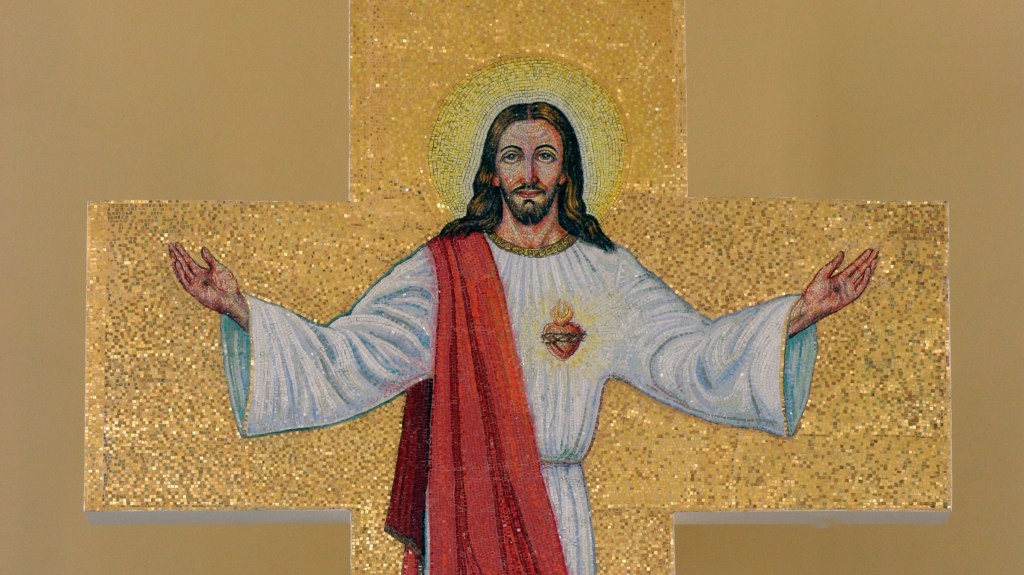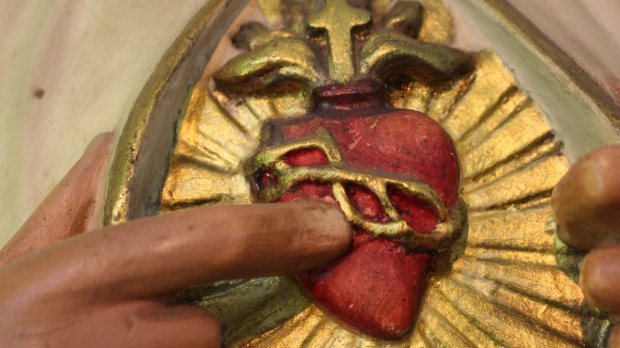Pope Francis says the “beautiful practice of the reparation of the Sacred Heart of Jesus,” is an important practice for all the baptized, even if today it “may be somewhat forgotten or wrongly judged obsolete.”
The Pope spoke of “reparation” — a practice by which someone who has wronged God and neighbor tries to make right, or “repair” the wound — in an address marking the 350th anniversary of the apparitions of Jesus to St. Margaret Mary.
The Catechism speaks of reparation like this:
2487 Every offense committed against justice and truth entails the duty of reparation, even if its author has been forgiven. When it is impossible publicly to make reparation for a wrong, it must be made secretly. If someone who has suffered harm cannot be directly compensated, he must be given moral satisfaction in the name of charity. This duty of reparation also concerns offenses against another’s reputation. This reparation, moral and sometimes material, must be evaluated in terms of the extent of the damage inflicted. It obliges in conscience.
And:
1491 The sacrament of Penance is a whole consisting in three actions of the penitent and the priest’s absolution. The penitent’s acts are repentance, confession or disclosure of sins to the priest, and the intention to make reparation and do works of reparation.
The Holy Father noted both the Old Testament and New Testament context for reparation.
He also said:
Jesus asked St. Margaret Mary acts of reparation for the offenses caused by the sins of humanity. If these acts consoled His heart, this means that reparation can also console the heart of every wounded person.
The Holy Father emphasized two necessary attitudes/actions in order to make reparation possible.
Below are excerpts of the full translation of his address, emphases our own:
“Repairing the irreparable”
Reparation is a concept we find often in the Sacred Scriptures. In the Old Testament, it takes on a social dimension of compensation for evil committed. This is the case for the Mosaic law that provides for the restitution of what had been stolen, or the reparation of the damage caused (cf. Ex 22:1-15; Lev 6:1-7). It was an act of justice aimed at safeguarding social life.
In the New Testament, however, it takes the form of a spiritual process, within the framework of the redemption brought about by Christ. Reparation is fully manifested in the sacrifice of the Cross. The novelty here is that it reveals the Lord’s mercy towards the sinner. Reparation therefore contributes to the reconciliation of men between themselves, but also to reconciliation with God, because the wrong done to our neighbour is also an offence to God. As Ben Sirac the Wise says, “Do not the tears of the widow fall on the face of God?” (cf. Sir 35:18).
Dear friends, how many tears still flow on the face of God, while our world experience so much abuse against the dignity of the person, even within the People of God!

The title of your conference puts two opposing expressions together: “Repairing the irreparable.” In this way it invites us to hope that every wound can be healed, however deep it may be. Full reparation at times seems impossible, such as when goods or loved ones are definitively lost, or when certain situations have become irreversible. But the intention to make amends and to do so in a concrete way is essential for the process of reconciliation and the return to peace in the heart.
Reparation, to be Christian, to touch the heart of the offended person and not to be a simple act of commutative justice, presupposes two demanding attitudes: recognizing oneself as guilty and asking for forgiveness.
2 Attitudes
Recognizing oneself as guilty. Any reparation, human or spiritual, begins with acknowledgment of one’s own sin. “Self-accusation is part of Christian wisdom; this pleases the Lord, because the Lord welcomes the contrite heart” (Homily at Mass at Santa Marta, 6 March 2018). It is from this honest acknowledgment of the wrong done to one’s brother or sisters, and from the profound and sincere sentiment that love has been harmed, that the desire to make amends arises.
Asking for forgiveness. It is the confession of evil committed, following the example of the prodigal son who says to the Father: “I have sinned against heaven and before you; I am no longer worthy to be called your son” (Lk 15:21). Asking for forgiveness reopens dialogue and manifests the will to re-establish the bond of fraternal charity. And reparation – even a beginning of reparation or simply the will to make amends – guarantees the authenticity of the request for forgiveness, it expresses its depth, its sincerity, it touches the heart of the brother, consoling him and inspiring in him acceptance of the forgiveness requested. Therefore, if the irreparable cannot be completely repaired, love can always be reborn, making the wound bearable.

For all the baptized
Jesus asked St. Margaret Mary acts of reparation for the offenses caused by the sins of humanity. If these acts consoled His heart, this means that reparation can also console the heart of every wounded person. May the work of your conference renew and deepen the meaning of this beautiful practice of the reparation of the Sacred Heart of Jesus, a practice that today may be somewhat forgotten or wrongly judged obsolete. And may it also help to enhance its rightful place in the penitential journey of each baptized person in the Church.
I pray that your Jubilee of the Sacred Heart may awaken in many pilgrims a greater love of gratitude to Jesus, a greater affection; and that the shrine of Paray-le-Monial may always be a place of consolation and mercy for every person in search of inner peace. I give you my Blessing. And I ask you, please, to pray for me. Thank you!




